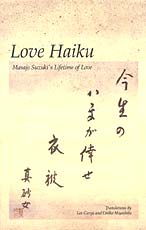|
Webster’s
Collegiate Dictionary defines haiku as "an unrhymed verse
form of Japanese origin having three lines containing usually
five, seven, and five syllables respectively." This spartan
definition does not fully describe the lyrical beauty and
extraordinary emotional range of this style of writing. In the new
book "Love Haiku: Masajo Suzuki’s Lifetime of Love,"
translators Lee Gurga and Emiko Miyashita have assembled a
collection of some of the most beautiful examples of love haiku
written by Japanese poet Masajo Suzuki.

Born
as Masa Suzuki in 1906, Masajo met her destined love, Y.M., in
1937; this relationship proved to be one of her greatest
inspirations for writing love haiku. At a pivotal moment in her
life she opened a tiny pub in Ginza, Tokyo, called Unami (April
Waves); it is during this time that her talent for writing love
haiku began to emerge.
Although
the experience of Unami and her relationship with Y.M. was an
important part of her life, she admits that "the influence of
arts and artists on me have been not small, but what has most
influenced my haiku? Love! It has been the source all of my
artistic activities."
In
the book's introduction Patricia Donegan and Yoshie Ishibashi
describe the impact of love on Masajo’s work: "She is not
just a love poet in the sense of writing about her lover and love
relationship, but a love poet in the larger sense of loving life
and living it fully…all her haiku are imbued with passion, a
passionate sense for living."

The
selections represent some of Masajo's most inspired work and
confirm her passion and love of life. The book contains 150 love
haiku that were selected from her seven books, published between
1955 and 1998.
Aside
from the theme of love, a central characteristic of love haiku is
the use of "seasonal words." The translators describe
this defining element as "the presence of a seasonal
reference that relates one’s personal experience to the always
changing but ever recurring cycle of the seasons."

Integrating
seasonal words with the concept of love is a prominent feature of
Masajo's work. In her 1955 book "Ikesukago" (Banjo
Creel) she writes of loneliness and her attempts to reconcile the
helpless feelings within her soul:
spring
loneliness-
it
falls short of the surf
this
stone I toss
The
season of summer and her reliance on the value of work are
eloquently expressed in a love haiku from her 1961 book "Unami"
(April Waves):
summer
kimono sash-
my
destiny in my hand
in
my own hands
[to
top of second column in this review]
|

The
influence of nature on Masajo’s haiku is not limited to the
seasons; in her 1969 book "Natsuobi" (Summer Kimono Sash)
a strawberry evokes a reminder of first love:
longing
for love-
I
place a single strawberry
in
my mouth
Finally,
in her 1976 book "Yubotaru" (Evening Firefly), Masajo's
self-reflection reminds her of the regrets of her life, particularly
the death of her ex-husband:
without
regret…
is
such a life possible?
beer
foam overflowing
(Note:
Beer is used as a seasonal word for summer)
Masajo
Suzuki is considered by many to be one of Japan’s premier love
haiku poets. Her writing embraces "a luminosity of
language" that allows her to "express the theme of love as
directly and consistently… as if looking into the diary of her
love life, or into human beings deepest desire." Traditionally
considered a male form of literature, 20th century love
haiku has come to be symbolized by a voice that epitomizes the love
of the human heart and the emotions of our soul. That remarkable
voice is Masajo Suzuki.

"Love
Haiku: Masajo Suzuki’s Lifetime of Love" is an outstanding
collection of haiku poetry that spans almost 50 years. Translators
Lee Gurga and Emiko Miyashita's collaboration serves to reinforce
Masajo's reputation in haiku literature and ensures her exposure to
a wider international audience.
Both
translators have impressive credentials in the modern haiku
community. Emiko is a Dojin (leading member) of the Ten’i (Heaven’s
Work) haiku group and a member of both the Haiku International
Association and the Haiku Society of America. Gurga is a past
president of the Haiku Society of America and serves as associate
editor of Modern Haiku. He is also an award-winning haiku poet and
considered to be one of the Midwest’s leading practitioners of the
art. The translators are to be congratulated for bringing the beauty
and grace of Masajo’s work to the public's attention.

"Love
Haiku" is recommended to anyone who enjoys poetry or is
interested in learning more about this timeless literary art form.
For
more information, visit the Public Library at 725 Pekin St. or call
217-732-8878.
[Richard
Sumrall,
Lincoln Public Library District]
For
a February article about Gurga, click below:
http://archives.lincolndailynews.com/mount/
020100/features/artsbook.htm
Click
here for "Gurga
wins first place in haiku contest," posted Sept. 1.
|

